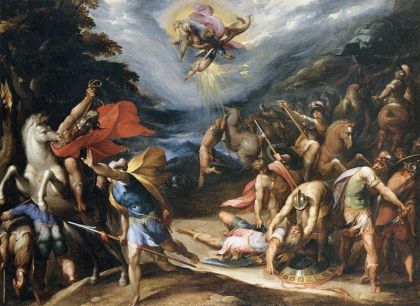Augustine’s Confessions Book II, Chapters 2-3
I strayed still farther from you and you did not restrain me…For your almighty power is not far from us, even when we are far from you. –Confessions II.2
To be Christian is to be in conversion, but that also means that we must recognize our past and God’s presence even in our darkest moments. Here in these two chapters, we find a stark picture of Augustine prior to his conversion to Christianity, seen now through the eyes of Augustine the believer. He recognizes the depths of his depravity and his continued descent into sin and lust, and at the same time recognizes that even though it seemed that God was not present, He was, in fact, always there: “How presumptuous it was for me to say that you were silent, my God, when I drifted farther and farther away from you!” (II.3). Even in the depths of sin, lust, and fornication, Augustine recognizes that God was still present, all at once never impinging on Augustine’s free will, but always waiting for the future bishop to return to His loving embrace.

Hans Speckaert (circa 1540–circa 1577) [Public domain], via Wikimedia Commons
Despite my continued spiritual quest through the New Age movement, God was essentially not part of my life, but he was certainly still present. I searched for fulfillment in all the wrong places, and like Augustine, “I should have awaited your [God’s] embrace with all the greater joy” (II.2). I found that while He was not a part of my life, I was certainly a part of His; in other words, He was always present, a fact that I can see so clearly now that I can hardly believe that I didn’t see it before.
I never saw him working through my parents. Through my mom’s and dad’s encouragement, or my sister’s willingness to be with her little brother (even when he was annoying). I didn’t see Him in the presence of my grandparents, who did so much to support my sister and myself, particularly my grandmothers, who constantly showered love on both of us and prayed for us every day. I never saw his presence in that of my teachers, who tried to push me beyond my own self-imposed procrastination-laden limits. In short, I was blind to His love present in the actions of others, and I wouldn’t begin to discover it until I was nearly 20 years old.
When we are mired in selfishness and sin, we are blind to God, our neighbors, and ourselves. Sin and vice cut us off from the divine life, and leave us empty, thrown askew into the world, to the point to where sin itself becomes the goal, in order to meet the expectations of the world, rather than seeking the goal that is heaven:
Nothing deserves to be despised more than vice; yet I gave in more and more to vice simply in order not to be despised. If I had not sinned enough to rival other sinners, I used to pretend that I had done things I had not done at all, because I was afraid that innocence would be taken for cowardice and chastity for weakness. (II.3)
But of course, we have hope, so much hope! Following Jesus Christ, we find that God is in fact always present in our lives, no matter what the mistake, misstep, or sin. We may find it difficult to approach His love, especially amidst a world that has, in many cases, confused sin for virtue, vice for love.
Like Augustine, let us begin to move toward God and heed the words of Saint Paul:
Put off your old nature which belongs to your former manner of life and is corrupt through deceitful lusts, and be renewed in the spirit of your minds, and put on the new nature, created after the likeness of God in true righteousness and holiness. (Eph. 4.22-24)
Questions for reflection:
- Where has sin and vice made me blind to God’s presence in my life?
- How has God worked through other people in my life in order to draw me closer to Him?
Up next time: Confessions II.4-5
This is part of a continuing series, Companions on the Journey, which travels along with a particular companion in the spiritual life, one of the great saints, in order discover how some of their writings might be applicable to our everyday lives. Currently, we are traveling with Augustine of Hippo through his work, Confessions. You can take a look at previous posts in the series or read the introduction.
+JMJ+